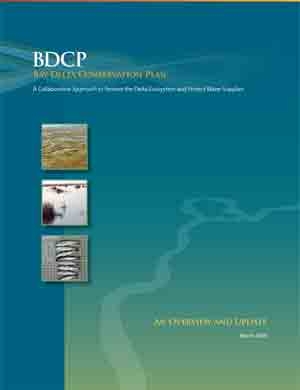Posts Tagged: Delta
Analysis says canal could create 129,000 jobs
Supes take stand against aquatic invasives
Kyle Magin, The Union
Nevada County supervisors resolved to support an inspection program for aquatic invasive species, reports Kyle Magin for The (Grass Valley) Union. The article discusses a report by Greg Giusti, UC Cooperative Extension forest and wildlands ecology advisor, which recommends water managers in the state adopt uniform measures regarding boat inspections.
Farmers and fisherman unite to restore delta
Family farmers and fishermen, California Indian tribes and grass roots environmentalists are working together to preserve the Sacramento-San Joaquin River Delta and the fish and communities that depend on it for their livelihoods, according to a commentary by Dan Bacher published on Calitics.com.
Calitics is a "progressive online community" that provides individual Californians a platform for discussing state issues and campaigning. Anyone can sign in and contribute to the blog.
Bacher reported on the "Farms & Salmon Summit," held last month in Atwater. During the forum, farmers and fishermen urged political leaders to stop the construction of the peripheral canal, take action to restore salmon, striped bass and other runs, and protect delta and Sacramento Valley agriculture, Bacher wrote. U.S. Representatives in attendence highlighted the importance of keeping the agricultural and fisheries industries healthy.
Ideas and commentary shared at the summit:
- U.S. Rep. John Garamendi said there is a symbiotic relationship between the agricultural community and aquatic interests. "We have to work together to protect the Delta - the solution is not to export more water out of the Delta."
- Rep. Jackier Speier noted that salmon fishing and agriculture are both integral components of the California economy.
- Congressmen Mike Thompson said decisions regarding the Delta and salmon populations should be based on good science. "When science goes out the window, everything goes out the window," Thompson was quoted.
- Vineyard owner Mark Wilson suggested the state start dredging delta river channels. "This would provide material for rebuilding levees, along with restoring the capacity of the delta channels to move water," he was quoted.
- Cathy Hemley from Greene & Hemley Farms in Courtland concluded, "We need to think like a fisherman. We need to think like a farmer. We need to make California sustainable."
Draft delta plan falls short, scientists say
A mid-course review of the draft Bay Delta Conservation Plan by a panel of scientists found the document to be "fragmented, incomplete and hard to understand," according to a report by McClatchy Newservice reporter Michael Doyle.
UC Berkeley emeritus professor Henry Vaux Jr. chaired the panel that reviewed the plan, which has been in the works since 2006, has already cost about $150 million and involved hundreds of meetings among state and federal agencies, water districts and environmental and conservation groups.
"Given the time and expenditure of money, people could have reasonably expected to get a plan that was more complete," Vaux was quoted in the story.
AP reporter Gosia Wozniacka wrote that the panel found it unclear whether the main purpose of the plan was simply to build a canal or pipeline, or whether it is a broader plan that would restore and protect the delta ecosystem and provide a stable water supply.
"If you don't know what it is you want to do, it creates a lot of confusion, because the application of science is different depending on what you want to accomplish," Wozniacka quoted Vaux.
Deputy Secretary of the Interior David Hayes said the review provides useful guidance as the plan continues to be developed.
UC hosts water discussion in San Ramon
A group of Contra Costa County citizens brought together yesterday by UC Cooperative Extension agreed that the state needs to improve water infrastructure to store more water, improve water conservation efforts and improve water management to mitigate problems in the Sacramento-San Joaquin Delta region.
Thursday's discussion was one in a series being held by the UCCE Community Water Conversations Project, which aims to provide California citizens with an opportunity to discuss and learn about water policy options in a facilitated, non-threatening and positive environment.
Many participants in Thursday's conversation believe the Delta water issue will reach a crisis point if efforts aren't made to strengthen infrastructure and promote conservation, according to an article in the San Ramon Patch. Political disillusionment is also a common feeling expressed by many forum participants, according to Jodi Cassell, natural resources advisor for the Contra Costa County Cooperative Extension.
"I think in this country, especially now, people are looking for ways on their own to know as much as they can about very complex issues because they don't feel they can go to governmental agencies to get what they need," Cassell was quoted in the newspaper article. "These conversations will hopefully guide them through a part of public policy as multi-faceted as this state's water usage and make them more engaged in the political process that drives it."
Craig Paterson, project manager and moderator of Thursday's forum, said the organizers wish to gather a range of opinions to share with policy makers that will inform decisions in which everybody wins. In January, project staff will finalize video and written reports on the forum's participants and their views.
In a UC Green Blog post, director of UC Cooperative Extension in Solano County Carole Paterson shared common themes that have emerged from a preliminary review of 10 water conversations that took place this year. The themes, she said, are:
- Frustration. People believe the public policy process is flawed.
- Education. People do not understand what is happening to their water. The issues are extremely complex and over the years, layer upon layer of legislation, lawsuits, court decisions and media reports have muddied the water.
- Science. People are concerned that science is being manipulated by various stakeholders to support a particular point of view.

Farmland in the Sacramento-San Joaquin Delta.
Farm revenues down just 3 percent due to water losses
The most recent estimates of job losses due to cuts in water allocations from the Sacramento-San Joaquin Delta are far lower than was first predicted, according to an article published last week in the Contra Costa Times.
In early 2009, UC Davis economist Richard Howitt predicted the drought and new restrictions on Delta pumping would cost 95,000 jobs, but he revised the figure downward a number of times. Even though, the old number is still sometimes used, recently by Republican gubernatorial candidate Meg Whitman and Republican U.S. Senate candidate Carly Fiorina, the article said. "Yes, it's a problem when candidates don't use the most recent and accurate figures," Howitt said in an e-mail to reporter Mike Taugher. "I have tried to correct this, but this combined report should help put some of the outdated values to rest."
Current estimates of lost farm revenue in agriculture because of water shortages are $340 million (by Jeffrey Michael, director of the Business Forecasting Center at the University of Pacific) and $370 million (by Howitt). In both cases, that represents a less than 3 percent decline in San Joaquin Valley farm revenues. Job losses are estimated to be between 5,500 and 7,500 jobs.


